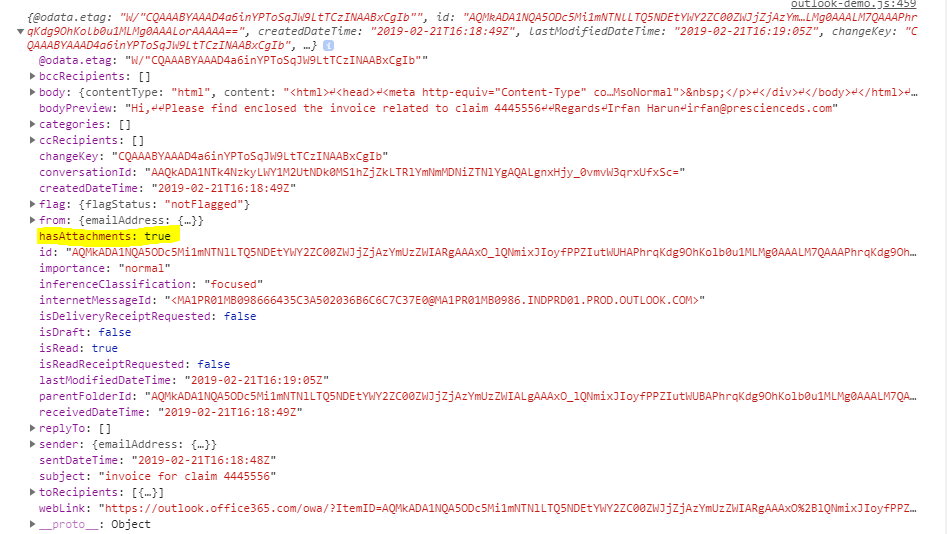Скачать вложения из почты с помощью microsoft graph rest api
Я успешно получаю список писем в папке "Входящие" с помощью Microsoft Graph Graph Rest Api, но мне трудно разобраться с документацией о том, как загрузить вложения из почты.
Например: ответ на этот вопрос stackru говорит о том, чего я намерен достичь, но я не понимаю, что такое message_id в упомянутой конечной точке:https://outlook.office.com/api/v2.0/me/messages/{message_id}/attachments
ОБНОВИТЬ
я смог получить подробную информацию о вложении, используя следующую конечную точку: https://graph.microsoft.com/v1.0/me/messages/%7Bid%7D/attachments и получил следующий ответ.
У меня сложилось впечатление, что ответ, вероятно, будет содержать ссылку для загрузки вложения, однако ответ содержит ключ с именем contentBytes, который, как мне кажется, является зашифрованным содержимым файла.
3 ответа
У меня такая же проблема. Это функция, которую я использовал для ее решения. Обратите внимание, что 'contentBytes' уже закодированы в base64, поэтому вам нужно декодировать их для записи. Вы делаете это с помощью base64.b64decode. Если вы этого не сделаете, ваши файлы будут сохранены, но их будет невозможно прочитать.
def save_attachments(self, message_id):
""" Saves the email attachments obtained from MS Graph REST API.
"""
# Set the API endpoint. This will give all the attachments for a given email (message_id provided)
url = f"https://graph.microsoft.com/v1.0/me/messages/{message_id}/attachments"
# using the MS Graph client to make the call as this is a 'delegated' email authorization
# this will create a flow with a URL and a code for the owner of the email account
# to authorize its use. You can use requests instead if you have the access in AAD. (Application scenario)
response = self.user_client.get(url)
# gets the 'value' part of the json response, which contains all the attachment details
attachments = response.json()['value']
counter = 0
# Save the attachment content to a file
for attachment in attachments:
counter+=1
file_name = attachment["name"]
content_bytes = attachment["contentBytes"]
full_file_name = os.path.join(file_path, file_name)
with open(full_file_name, "wb") as f:
# converts text to base64 encoded bytes
# remember to add the import from base64 import b64decode
decoded_content = b64decode(content_bytes)
f.write(decoded_content)
print(f"{counter}. {file_name}.")
За attachment ресурс типа файла contentBytes возврат имущества
base64-закодированное содержимое файла
пример
В следующем примере Node.js показано, как получить свойства вложения вместе с содержимым вложения (существует зависимость от request библиотека):
const attachment = await getAttachment(
userId,
mesasageId,
attachmentId,
accessToken
);
const fileContent = new Buffer(attachment.contentBytes, 'base64');
//...
где
const requestAsync = options => {
return new Promise((resolve, reject) => {
request(options, (error, res, body) => {
if (!error && res.statusCode == 200) {
resolve(body);
} else {
reject(error);
}
});
});
};
const getAttachment = (userId, messageId, attachmentId, accessToken) => {
return requestAsync({
url: `https://graph.microsoft.com/v1.0/users/${userId}/messages/${messageId}/attachments/${attachmentId}`,
method: "GET",
headers: {
Authorization: `Bearer ${accessToken}`,
Accept: "application/json;odata.metadata=none"
}
}).then(data => {
return JSON.parse(data);
});
};
Обновить
В следующем примере показано, как загрузить вложение в виде файла в браузере.
try {
const attachment = await getAttachment(
userId,
mesasageId,
attachmentId,
accessToken
);
download("data:application/pdf;base64," + attachment.contentBytes, "Sample.pdf","application/pdf");
} catch (ex) {
console.log(ex);
}
где
async function getAttachment(userId, messageId, attachmentId, accessToken){
const res = await fetch(
`https://graph.microsoft.com/v1.0/users/${userId}/messages/${messageId}/attachments/${attachmentId}`,
{
method: "GET",
headers: {
Authorization: `Bearer ${accessToken}`,
Accept: "application/json;odata.metadata=none"
}
}
);
return res.json();
}
Зависимость:
download.jsбиблиотека
Я не знаю, поможет ли это, но вам просто нужно добавить / $ value в конце вашего запроса:
https://graph.microsoft.com/v1.0/me/messages/{message_id}/attachments/{attachment_id}/$value
